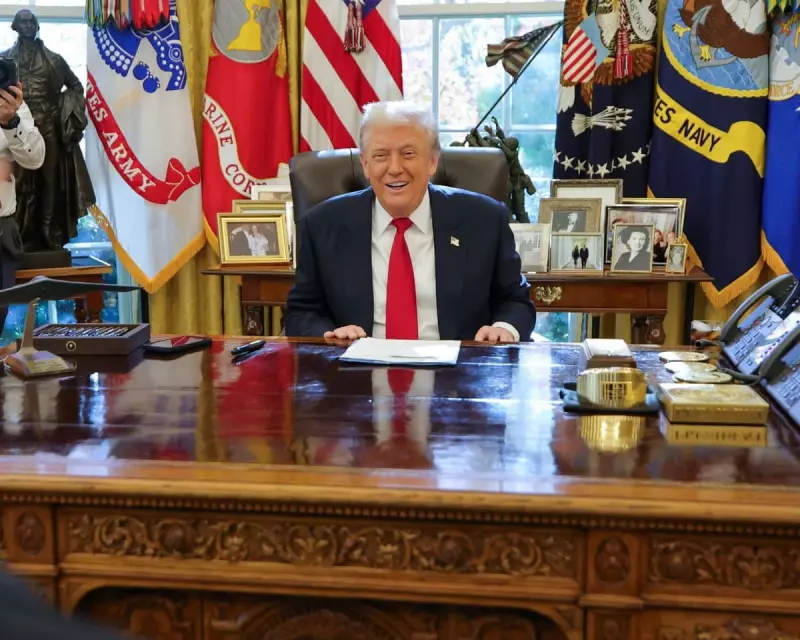
Luxury Gifts to Trump Prompt Ethics Concerns Amid Tariff Decision
Former US President Donald Trump found himself at the centre of an international ethics controversy after accepting a gold Rolex desk clock and a $130,000 engraved gold bar from a delegation of Swiss billionaires in early November 2025. The lavish presents arrived just weeks before Trump made the decision to dramatically reduce punitive tariffs on Swiss imports, raising eyebrows on both sides of the Atlantic.
European Outrage Over "Golden Charm Offensive"
The timing of the gifts has drawn sharp criticism from European politicians, who question whether US foreign policy is becoming overly personalised. Italian MEP Pasquale Tridico, formerly head of Italy's National Institute for Social Security, expressed his disgust at what he termed a "golden charm offensive" coming shortly before Trump slashed 39% tariffs on Swiss imports to just 15%.
"This is really awful," Tridico stated, adding that it appeared to represent "making foreign policy the policy of individuals" rather than following established diplomatic protocols.
The criticism extended to Switzerland itself, where Green party president Lisa Mazzone suggested that Trump's "corrupt logic had poisoned the Swiss elite." She questioned the democratic legitimacy of relying on wealthy private interests to influence international negotiations.
How the Gifts Came to Light
The story might have remained hidden were it not for internet investigators who noticed an unfamiliar clock positioned on Trump's Oval Office desk in official photographs. The timepiece was identified as resembling Rolex's Datejust model, a self-winding wristwatch first introduced in 1945 that has become a valuable collector's item.
Watch experts from Hodinkee analysed the clock's distinctive features, noting its "fluted, gold coloured bezel, a green dial, and a cyclops to magnify a date complication." They determined it was not a commercially available product, sparking further investigation into its origins.
The trail led back to photographs of a seven-member Swiss delegation that visited Trump during the first week of November. Among the group were Jean-Frédéric Dufour, head of Rolex, who described the clock in a letter to the president as "a modest, refined expression of traditional Swiss watchmaking."
The gold bar, valued at approximately $130,000, came from Marwan Shakarchi, head of Swiss gold refining company MKS. The ingot featured engravings of the numbers 45 and 47, honouring Trump's first and potential second presidency. Photographic evidence showed another gold item with the word "president" engraved along its spine, though it remains unclear whether this was the same bar.
Swiss Media and Official Reactions
Within Switzerland, the gift-giving prompted mixed reactions. Swiss publicist and political commentator Hannes Britschgi described the presents as "undignified," while Doris Kleck, deputy editor in chief of CH Media, suggested it reflected Switzerland's need to resort to extravagant measures to capture Trump's attention.
"Trump loves being fawned over by billionaires," Kleck told a Swiss radio programme. "It's terrible that one has to shower the US president with gold to get Switzerland back on his agenda."
However, Swiss economy minister Guy Parmelin defended the lobbying efforts, telling the Tages-Anzeiger newspaper: "We haven't sold our soul to the devil." He described Trump's decision to reduce the punitive tariffs as bringing "great relief" to Swiss exporters and bringing Switzerland in line with EU tariff rates.
White House Response and Gift Protocol
A White House spokesperson firmly denied any connection between the gifts and the tariff reduction, stating that "the only special interest guiding President Trump's decision-making is the best interest of the American people." The official noted that the tariff agreement followed Switzerland's commitment to invest $200 billion in American manufacturing and employment.
Regarding gift acceptance protocols, an official explained that the White House receives thousands of gifts that typically go to the National Archives, though they may be displayed in the presidential library or museum during a president's term. Presidents may choose to personally retain or purchase some gifts, though such items are subject to taxation.
The controversy highlights ongoing concerns about the intersection of personal gift-giving and political decision-making at the highest levels of international diplomacy, particularly involving figures known for their business backgrounds and unconventional approaches to foreign policy.





